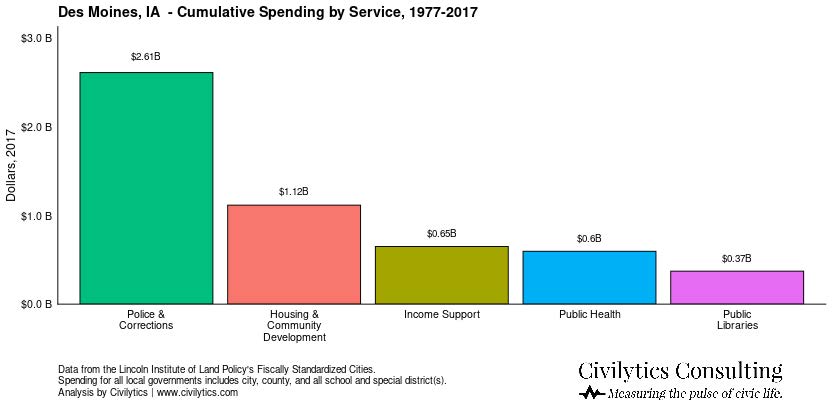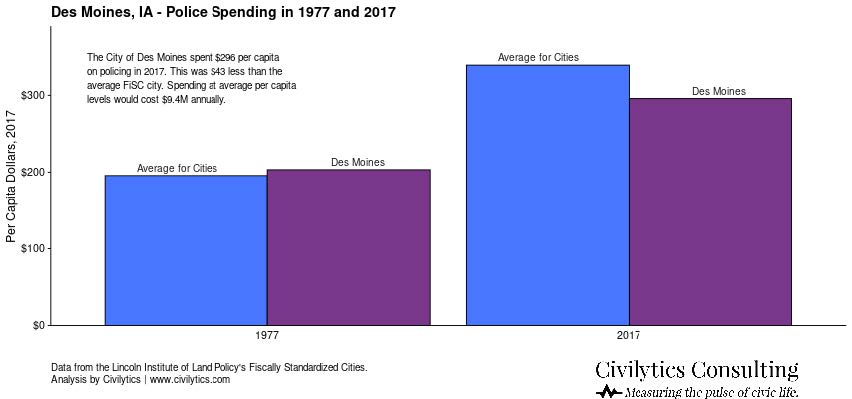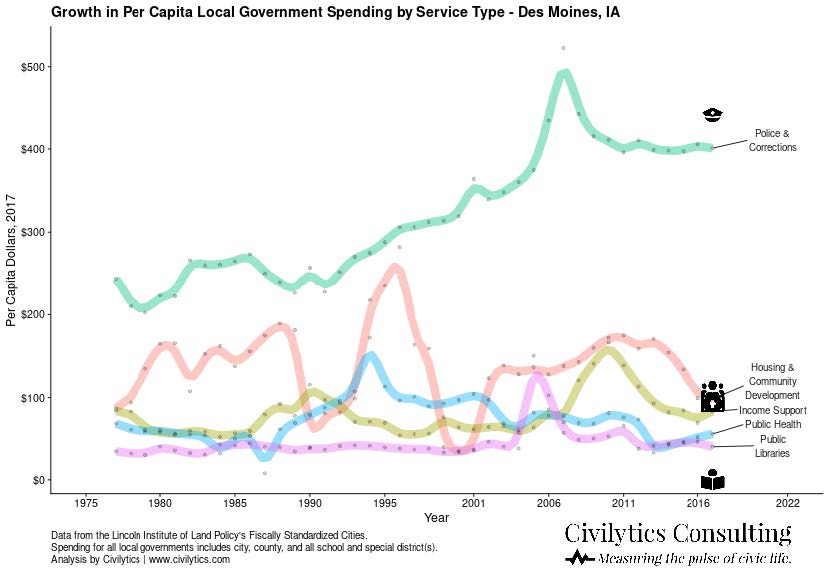Analysis of the Des Moines FY23 Budget
As we explore the many ways that the Des Moines Police and the City should pursue reform for improved public safety, our research has taken us to police funding. To be clear, Just Voices does not agree with the position of “defunding the police” in its purest sense. We do, however, feel the DMPD budget could be reallocated in some ways by moving dollars to more city services and programs that meet the socio-economic needs of our city residents.
To start our research of the 2022/23 Des Moines city budget, we enlisted the expertise of Civilytics. We receive free technical assistance from Civilytics because we are a grant recipient of the Borealis Foundation’s “Communities Transforming Police Fund”. We asked Civilytics to examine the Des Moines city budget and specifically the budget of the Des Moines Police Department. We are now sharing their findings with you so the community can be aware and informed. Feel free to contact us with any questions at [email protected].
Key Takeaways
1) $37 of every $100 from Des Moines’ discretionary budget (General Fund) is spent on policing.
- Over 95% of the PD’s budget comes from Des Moines’ General Fund.
2) The city spends:
- 5 times as much of its General Fund on policing as on parks & recreation
- 8 times as much of its General Fund on policing as on libraries
- 21 times as much of its General Fund on policing as on Neighborhood Services
- Almost 100 times as much on policing as on the Office of Civil and Human
Rights
3) Des Moines spends $375 per resident1 on policing.
- This means, for a family of 3 (2 adults and 1 kid or 1 adult and 2 kids, etc.), Des Moines spends over $1,000 on police.
4) The Des Moines PD has the most employees of any city department, 476 staff. Each employee in the PD costs the city an average of $140k.
- This is not the employee’s salary but reflects the total cost including benefits. It’s calculated by dividing the police department’s spending on personnel by the department’s total FTEs.
- This number is more useful than an employee’s salary for thinking about what alternatives a city could spend money on instead of a police officer. Eliminating a police position should free up this much money for the city to spend in other ways.
Overview
Des Moines’s operating budget for 2022-23 is $808.7 million. This includes the:
- General Fund = $202.7 million
- Special Revenue Funds = $253 million
- Includes $47 million in American Rescue Plan Act (ARPA) funds from the federal government. The budget does not seem to provide any information about how these funds will be used. It does show that last year’s city budget included $24M in ARPA funds and that the city plans to include the same amount ($24M) in next year’s budget.
- Other Special Revenue Funds come from Local Option Sales and Service Tax (the largest source of special revenue), road use tax, grants and gifts, and more. All of these can only be used for specific, targeted purposes.
- Debt Service Funds = $156 million (used to pay bonds and lease purchase payments)
- Enterprise Funds = $135 million. These funds come primarily from user service charges and must be used to fund the services that users are paying for – like Public Works ($98M). After Public Works, the largest enterprise funds go to Housing ($24M) and then Engineering ($11.5M).
- Internal Service Funds = $56M. These include employee health insurance, equipment maintenance, fuel, and more.
Des Moines’ 2022-23 General Fund is $208 million. 37% of this will be spent on police ($76 million). Des Moines spends more of its General Fund on policing than any other service.
Per resident, Des Moines spends $358 on the police department, $231 on the fire department, $74 on parks and recreation, $45 on the library, etc.
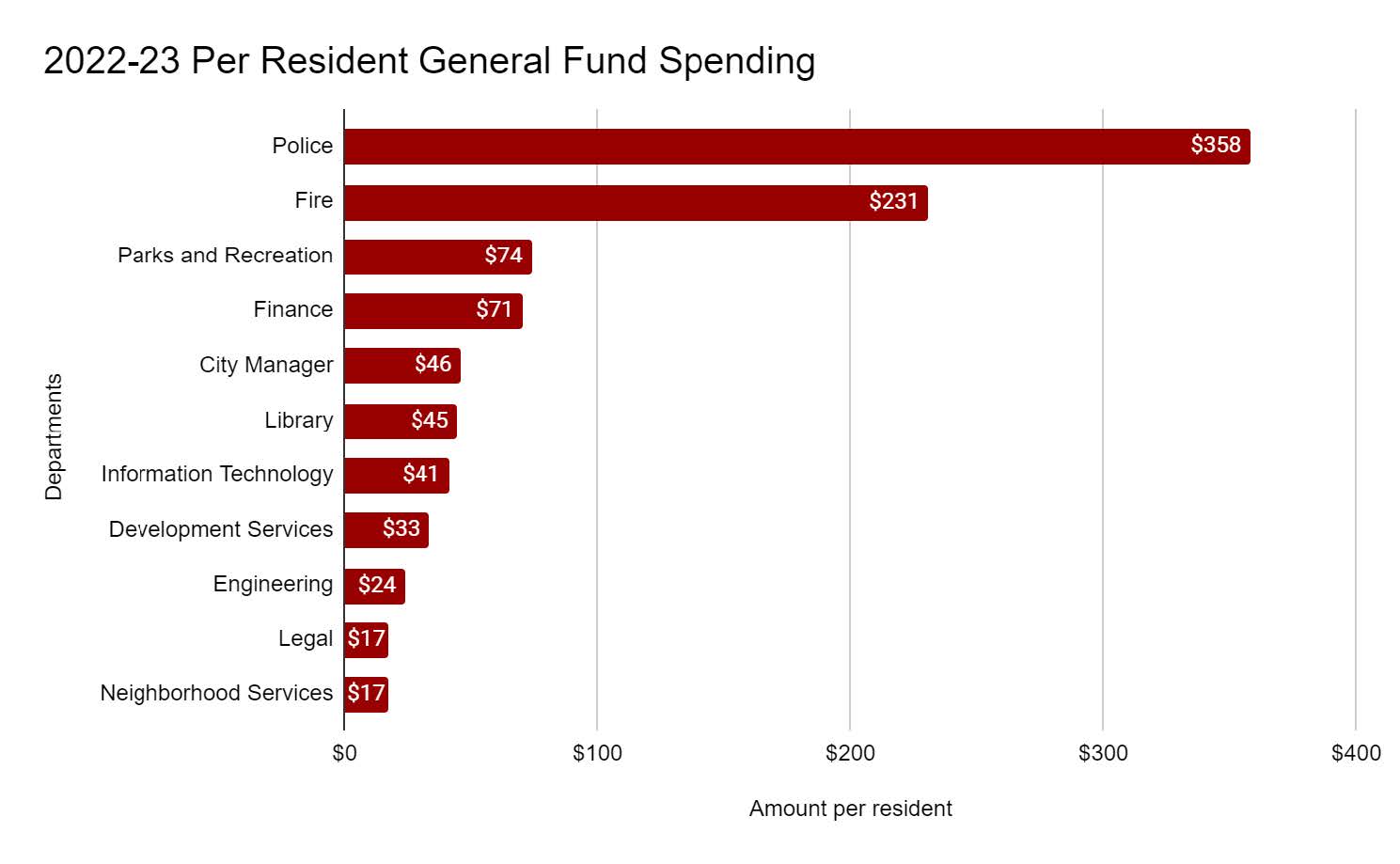 Police Department
Police Department
Des Moines will spend $79.5 million on its police department this year, of which 95% comes from the General Fund ($75.9M).
The department’s estimated revenue for the year includes:
- $5M in fines and forfeitures from the Patrol division
- $500k in forfeited funds
- $1.1M in federal grants, the largest of which is a Homeland Security SWAT grant ($493k) followed by a DOJ COVID-19 grant ($249k).
The PD budget for this year is 7% more ($4.9M more) than two years ago.
Des Moines’ PD budget, like that of most PDs, is 83% personnel costs. $66.3M goes to police department staff salary, benefits and other compensation.
Des Moines’ PD has 474 full-time equivalents (FTEs – a measure of staff). This is more employees than any other department. Of the city’s 1,663 total employees, about 29% work for the police department. That means 1 in every 4 city employees works for the PD.
The average cost of 1 FTE in Des Moines’ police department is $140,000 per year. This is not the same as the salary an employee receives but reflects the total cost to the city of a police officer. It’s calculated by dividing the police department’s overall spending on personnel by the department’s total FTEs.
- This is an underestimate of the average cost of a sworn officer since a sworn officer generally costs more than a civilian.
- Unfortunately, the budget does not show the number of sworn officers vs. civilian staff. It also does not show the number of vacant positions or the department’s vacancy rate. This could be information to ask the city for.2
Units or Divisions within the PD Program
Positions and spending express a department’s priorities. The Des Moines PD is organized into about 18 different units or divisions. The largest unit or division is Patrol, which accounts for almost half of the department’s spending (49% of expenditures, $37 million).
- The Patrol section has 214 staff. That’s about 1 patrol officer/staff per 1,000 residents.
The next largest division or unit within the PD is the Detective Bureau. The Detective Bureau has 70 staff, about 1 detective/staff for every 3,000 residents. The department spends 14% of its budget ($10.6 million) on the Detective Bureau.
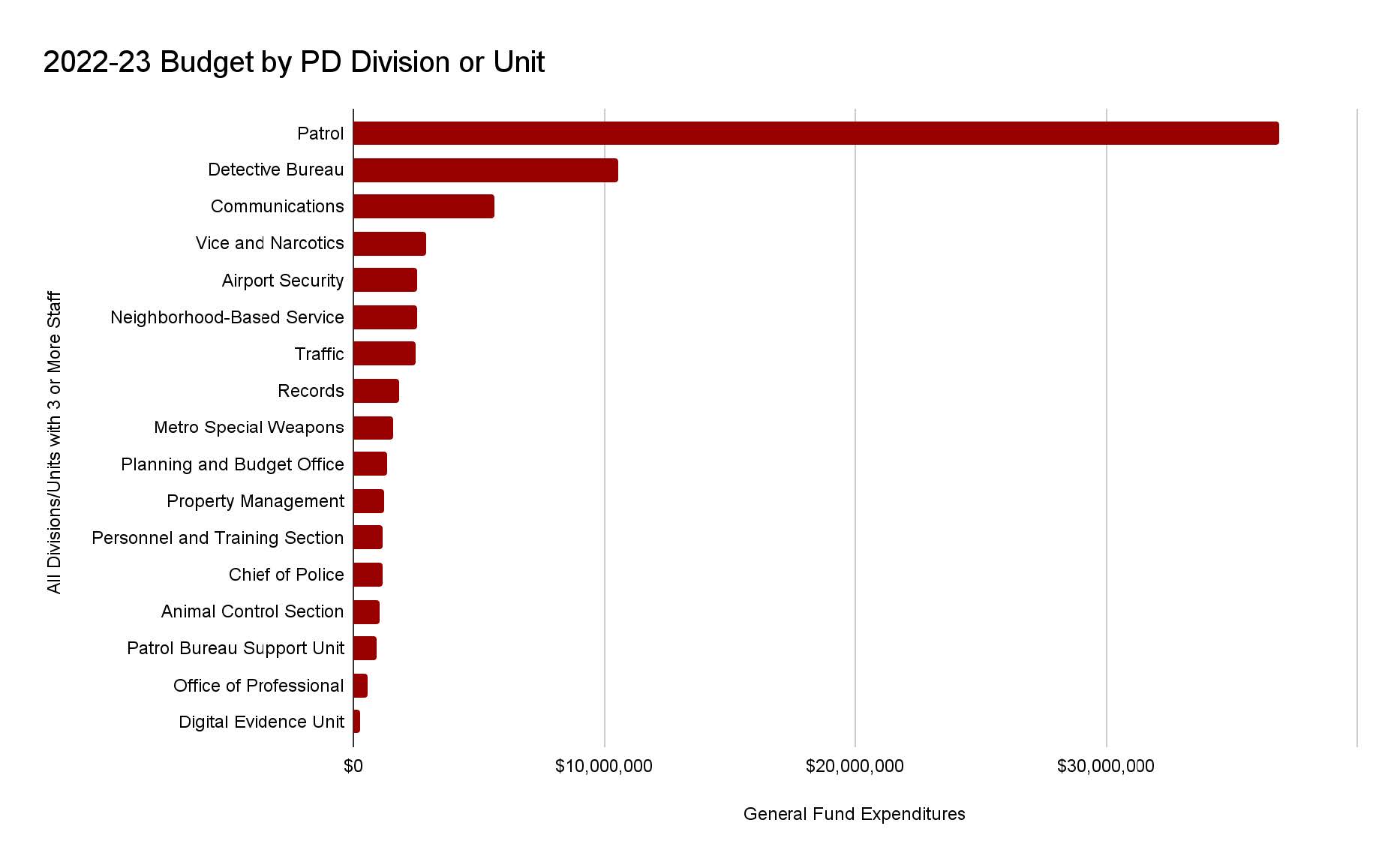 Des Moines’ PD Spending in Context
Des Moines’ PD Spending in Context
We can compare Des Moines’ public spending on policing to other cities using data that “fiscally standardizes” cities to compare spending in an apples-to-apples way.3
In the last 40 years, Des Moines has spent over 2.5 billion on Police and Corrections, more than twice as much as it’s spent on Housing & Community Development.
In 2017, Des Moines spent less per resident on policing than the average for the 200 largest cities in the U.S.
However, Des Moines spent much more on policing and corrections than on Housing, Public Health, or many other government services.
Download the Des Moines FY23 Budget Analysis as a PDF. Share it with anyone who pays taxes in Des Moines, and cares about how their money is spent.
Footnotes
1According to the 2021 Census data, Des Moines has 212,031 residents with an average household income of about $58k.
2Many cities include information on vacancy rates/vacant positions in their budget. Many PDs have vacancy rates higher than 5%. If we knew Des Moines’ PD had a vacancy rate of 5% (for example), we could say that eliminating vacant positions could free up $3.3 million for the city to spend on other services. (474 positions x 5% vacancy rate = 23.7 vacant positions x $140k per position = $3.3 million). If asking the city for this information, you might also ask for the department’s total number of sworn vs. civilian positions and vacancy rates for sworn vs. civilian positions.
3The Fiscally Standardized Cities data is a project of the Lincoln Land Institute:
https://www.lincolninst.edu/research-data/data-toolkits/fiscally-standardized-cities.
Explore the data on your own here.
